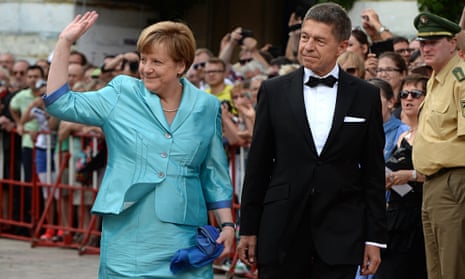Last Saturday I sat in something very close to rapture just a few feet away from Germany’s chancellor, Angela Merkel. But Merkel wasn’t making a speech. She wasn’t giving a press conference. And, although I live in hope, she wasn’t giving me an exclusive interview for the Guardian about Britain and the EU either.
Merkel was doing the same thing I was doing. She was at the opera house, listening to Wagner’s Tristan und Isolde. And not just in any old opera house. We were at the Bayreuth festival theatre, the legendary Wagner shrine in Bavaria. It was the opening night of the 2015 festival. Merkel was the guest of honour there, as she often is.
As I watched Merkel talking to audience members on the rope line after act one – it was said later, then emphatically denied, that she had fainted briefly during the interval – it struck me, not for the first time, that this was the sort of event at which no British political leader would appear comparably at ease. It’s not just that there aren’t many Wagner lovers in the British political class. It’s more that whenever British politicians see the word “culture”, they make their excuses and leave.
This is simply not true of German, French or Italian politicians, most of whom seem to feel utterly unthreatened by attending a theatre, an exhibition or a concert hall of any kind. Sitting a couple of rows behind Merkel last Saturday was the indestructible Hans-Dietrich Genscher, who served 18 years as foreign minister, under both Helmut Schmidt and Helmut Kohl. Schmidt was a sufficiently good musician to record Bach and Mozart concertos and even to have made an album entitled Helmut Schmidt – Chancellor and Pianist.
Of course, this admiration for German cultural seriousness must not be pushed too far, especially in connection with Bayreuth. Adolf Hitler loved the Wagner festival too. And not every continental European politician is a cultivated intellectual. Nor is every British politician a philistine. It’s just that an awful lot of them are.
There are, inevitably, some notable British exceptions. But not that many. David Miliband’s wife is a violinist and Harriet Harman’s daughter a bassoonist, so they have long been familiar faces at concert halls. Nick Clegg goes to concerts, and George Osborne likes the opera. Labour’s former chief whip Nick Brown, a man with a passion for Shostakovich, even turns up at Bayreuth sometimes. For many years, Ted Heath was an imposing and glowering presence at many concerts.
Yet with the exception of Heath, it is difficult to think of a British prime minister of my lifetime who has had a deep interest in high culture or who even felt any responsibility for associating the office with the arts. I remember hearing David Cameron, then leader of the opposition, make an extraordinarily graceful speech once at a British Museum event. But he keeps his distance from the cultural world these days, as party leaders of all stripes in this country mostly tend to do. If Jeremy Corbyn nurtures a secret love of Leoš Janáček and Richard Strauss – as the former Ulster Unionist leader David Trimble did – he keeps it well hidden.
John Major liked Italian opera, it is true, and Gordon Brown is a great reader and could at one time be seen at the theatre. However, Tony Blair – in whose company I once attended a performance of Puccini’s La Fanciulla del West – was always more of a rocker at heart. I also once briefly and bizarrely interviewed Margaret Thatcher for Radio 3, in the opera house in Kiev of all places, on the subject of Handel operas. “I like Handel very much. All those marvellous tunes,” she announced. Hats off to her for her readiness to talk about the subject at all, but I don’t really think high culture floated Thatcher’s boat, any more than it ever floated Harold Wilson’s.
Without excessively idealising the Germans or unreasonably demonising the British, it does seem worth asking why politicians in this country are so exceptionally cautious about embracing the arts in ways that do not embarrass other Europeans. It’s not, after all, as if Britain, or its component nations, have nothing in the arts, past or present, to embrace and celebrate. On the contrary, Britain is positively groaning with artistic achievement and cultural enterprise and energy. Yet in British politics today, a cultural life remains almost as much a taboo as a secret sexuality once was.
Part of the problem, obviously, is the enduring absence of a common culture. That’s especially obvious in England. A Scottish or Welsh politician might have fewer problems attending a national cultural event like an Eisteddfod or the Edinburgh festival. An English politician would be much less confident, even at a pop festival and certainly at Glyndebourne or the Proms, because so much about Englishness is so deeply challenged by unreconciled class perspectives. Even if there were a Bayreuth-equivalent annual Shakespeare festival at Stratford – which, perhaps significantly, there isn’t – I wonder whether many prime ministers would see it as part of their responsibility to attend the St George’s Day opening night.
I have spent decades writing about politics – and about music as well. I’m fascinated by politics because it embodies life as it is in reality. I’m fascinated by music because it expresses life as it might ideally be. I know many people in both worlds. Most of the musicians I know are very interested in politics. Very few of the politicians, on the other hand, are very interested in music or the arts. Perhaps they don’t have time. Perhaps they haven’t had enough education or opportunity. Perhaps they are afraid of being seen as posh. But perhaps, actually, they don’t think anything outside politics matters.
That is their loss as individuals. But it is also our loss as a society. I’m not pretending for a second that Labour would be in less of a state today if Andy Burnham was as comfortable talking about Elgar as he is about Everton. But I do think that part of what makes Merkel a great politician is that, because she likes Tristan, she understands there is more to life than politics.
I fear that the cultural cringe that affects so many of our own politicians is part of what has distanced so much of British politics from our shared national life, to our deepening common loss.

